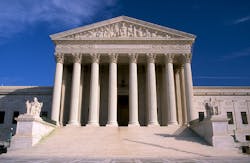Supreme Court to Decide Limits of Clean Water Act
Federal court decisions over groundwater pollution liability have created what a law professor calls “a spaghetti jungle” that the Supreme Court must untangle.
Since the beginning of the year, the U.S. Court of Appeals for the 4th, 5th, and 9th circuits have issued rulings that are at odds over the scope of the Clean Water Act when pollution reaches federally protected waterways from the groundwater.
According to Bloomberg BNA, municipalities, states, manufacturers and miners are looking to the Supreme Court to decide whether the Clean Water Act is limited to regulating direct pollution releases from discrete and defined pipes, tunnels, and drains into federally protected waters. The law could be extended to indirect releases from groundwater.
The U.S. EPA had taken the stance that the release of pollutants into federally protected water from a direct link to groundwater can be liable under the act. The agency under President Donald J. Trump’s administration is revisiting that position.
Conflicting court decisions have drawn attention from trade groups representing the oil, gas, mining and municipal wastewater sectors.
These groups could be faced with increased permitting costs and related liabilities if they fail to obtain Clean Water Act permits for indirect discharges of pollution to federally protected water from groundwater. Fines under the statue can run as high as $53,484 per day for violations.
The 6th Circuit issued two decisions on Sept. 24 in Tennessee. Clean Water Act Network v. Tenn. Valley Auth. and in Kentucky Waterways All. v. Kentucky Utils. Co.
The decisions clean up some of the uncertainty created earlier this year by the 9th Circuit in Hawaii Wildlife Fund v. Count of Maui and the 4th Circuit in the decision on Upstate Forever v. Kinder Morgan Energy Partners LP, according to Neal McAiley, an environmental attorney with Carlton Fields Jorden Burt PA.
According the 9th Circuit, Maui County was liable for wastewater it injected underground that migrated through groundwater to the Pacific Ocean. The 4th Circuit held that Kinder Morgan Energy Partner could be sued for the 2014 gasoline spill that polluted a river in South Carolina through groundwater seepage. Both courts used the U.S. EPA policy as their rationale to find liability.
